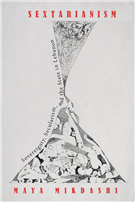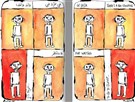On Thursday my friend invited us over for a home cooked meal and a card game (tarnib), combining two of our favorite recreational activities. In preparation, she had gone to one of our favorite dessert stores known for their almond ice cream. Two hours later, a car laden with over sixty kilograms of TNT exploded on the street that she drove home on.
There are countless stories like these. They embody a macabre spin on “missed connections.” After all, the car bomb had a target: the men, women and children that every day (and night) populate the passing cars, sidewalks, stores and buildings of that street in Rweiss, a neighborhood in the southern suburbs of Beirut. These suburbs are collectively referred to as “dahieh,” which only means “suburb” but once uttered performs a discursive and material separation between its residents of that suburb and those of Beirut “proper.” This separation, or amputation of dahieh was most acute during the 2006 war, when Israel’s war machine flattened entire blocks of neighborhoods while many Lebanese partied on with a vengeance, determined not to let this war disturb their summertime fun.
But this time it is different or, more hopefully, this time it will be different. Thursday`s attack was the first large scale bombing that explicitly targeted civilians since the civil war of 1975-1990.The logic behind the attack was that these residents, shopkeepers, and passersby were not really civilians because they were living, working, walking and driving on a road in a neighborhood that is considered Hizballah “territory.” They were probably even supporters of Hizballah, and thus not “really” civilians. The fact that this is the same logic the Israeli war machine and US war machine relies on under the guise of the War on Terror is not surprising. A similar logic is at play in Egypt today, as it is in Syria and in Iraq. The cold embrace of war now stretches from the rivers to the seas, reaching out towards Egypt, Yemen, Bahrain, Syria, Palestine, Lebanon, and Iraq.
Lebanon currently has no legitimate government, as the current parliament illegally voted to extend elections until a “better time” that has yet to materialize. The president`s term is set to expire and there is no legitimate parliament to either vote in a new president or extend this one`s ineffectual term. But, the fact that Lebanon has no government does not mean that there is no Lebanese state. State bureaucracy seems to miraculously sputter along, the judiciary continues to function, and illegally appointed cabinet members and parliamentarians continue to meet, argue, and issue statements. The security apparatus is firmly in place. The Lebanese state was in action on Thursday night. Fire fighters, civil defense teams, forensic experts and army units quickly arrived on the scene. Across Beirut the Lebanese army deployed in “strategic” areas where Lebanese Sunnis and Lebanese Shi‘iites live shoulder to shoulder, street to street, intersection to intersection.
Car bombs have a logic: to kill indiscriminately. But Thursday`s killing had a slightly altered logic, to kill those who are supposedly on Hizballah`s “side” in the radiating furnace that is today`s Syria and also perhaps, on Hizballah’s “side” when it comes to the defense of Lebanese civilians and territories from seemingly endless Israeli raids, incursions, occupations, kidnapping and killings. The spectacle of the car bomb was the event itself, and its message was clear: your life is cheap and can be bought and burned as quickly as oil.
The video that was released after the attack and claimed it spoke the language of heathens and heaven. This is a recently circulating (publicly, at least) lexicon in Lebanon, where Sunni-Shi‘i sectarianism has always been less about religion and more about structural, socio-economic and political factors. To put it crudely, the Sunni leadership historically viewed themselves as entitled to the Muslim “share” of power under Lebanon`s system of political sectarianism. The post civil war era saw the rise of Shi‘i political and economic power, and Sunni political, religious, and capital leadership has reacted to this change in fortune with an air of entitled defensiveness. By and large, these leaders read the shifting political and economic sands as indicative of an “uppity Shi‘i” syndrome, to borrow from racist attitudes prevalent among white Americans during the civil rights era. The Shi‘ia simply did not know their place anymore in Lebanese political and social hierarchies. The Sunni leadership was incredulous that they could lose their prime position within the Muslim “share” of the Lebanese state and economy.
Beginning with the invasion and occupation of Iraq and the Salafi and Takfiri anti-Shi‘i propaganda and funding oozing out of Saudi Arabia and (more recently) Qatar, Sunni sectarianism towards Shi‘a in Lebanon took on more prominent religious registers. Start up Salafis and start up Takfiris, funded and protected by Saudi Arabia and the Hariri family (who would rather burn the country than give up its “right” to power) became commonplace in Lebanon—the most prominent among them being Ahmad al-Asir. After Hizballah wholeheartedly, and publicly began to fight alongside the Asad regime in Syria—a conflict that has itself become colored red by Sunni-Shiite sectarianism and Takfiri groups—inter-Muslim sectarianism took on even more religious overtones in Lebanon. The video that claimed the bombing may not be “real,” and we may never know who in fact was behind the carnage. The perpetrators may not be Lebanese, but nevertheless the video has a Lebanese audience versed and primed in its script and its affective registers.
It has become a cliché to say that Lebanon is standing at the precipice of war. Without a government or hope of one, with a security state that has decided it is the government, with sectarian hatred at its highest since the civil war, growing inflation and unemployment, rampant corruption and cronyism, economic, and sectarian segregation (or attempts at it) cripple a country that is already overrun with guns and drugs and anxiety, grating with xenophobia and sexism and riddled with chronic electricity and water cuts, groaning infrastructure, a criminal and parasitic political class, and a seemingly endless tolerance for stasis. Refugees fleeing violence and displacement and death in Palestine, Syria, Iraq, and Sudan have tried to find peace here, but there is no peace to be found in Lebanon. The country and populace has yet to resolve, or question, or address, the underlying reasons for the long war that began in 1975, fanned out as ceasefire in 1989, and is always threatening to re-ignite. Certainly war cannot end while the war criminals and their sons and relatives continue to find support clothed in the promise of a better life for desperate and frightened populations and individuals. Certainly it will not end when sweets are distributed in Tripoli at the news of a car bomb in dahieh that claimed the lives (so far) of twenty-seven individuals and mauled over three hundred and thirty others.
This may be a new phase in Lebanon, that country as disabled and disabling, as murderer, and as martyr. The car bomb in Rweiss that ripped through the street my friend drove home on all stocked up on ice cream was a siren`s call. It was seductive and terrifying. But sitting here listening, it seems to be an all to familiar tune.
![[Cars Burning and Vegetables. Image from Al-Manar]](https://kms.jadaliyya.com/Images/357x383xo/dahye5.jpg)





